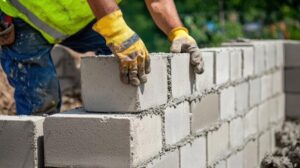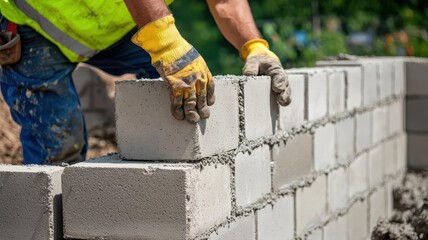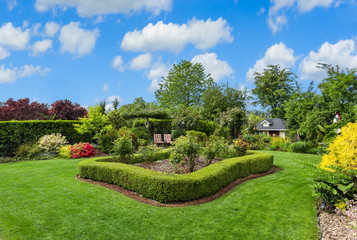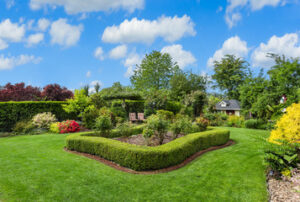Contractors work closely with architects, engineers, and construction professionals to ensure that the concrete work integrates seamlessly into the project’s design and structural requirements. They also have excellent communication skills and can collaborate effectively with all parties throughout the construction process.
In addition, reputable contractors carry adequate insurance coverage. You should ask about their insurance coverage during the estimate process.
Top concrete contractors are highly skilled at their craft and have years of experience working with different types of concrete materials. They understand the proper mixing ratios, surface leveling, and curing processes to create durable concrete structures. Additionally, they have the resources and manpower to handle large-scale projects quickly and efficiently. This can save construction timelines and reduce project costs by avoiding costly mistakes or delays.
In addition to their skills and expertise, reputable concrete contractors are committed to ensuring that their work meets industry standards. They are familiar with local building codes and regulations that ensure structural safety and environmental compliance. By following these guidelines, they can avoid costly fines or penalties. Additionally, a professional concrete contractor will work with architects and engineers to ensure that the final product is up to code.
When hiring a concrete contractor, it is important to ask about their credentials and insurance coverage. Make sure that they have a valid license for their area of expertise and that they carry liability insurance and workers’ compensation coverage. Additionally, you should check whether they offer a warranty for their services. A warranty shows that they stand by their work and will address any issues that may arise after the completion of the project.
Another key factor to consider is their reputation. Find out how long they have been in the business and see what previous clients have said about their work. Also, it is important to find out how they communicate with their clients during the project. Ideally, you should choose a concrete contractor who maintains open and transparent communication throughout the construction process.
A quality concrete foundation is essential to the success of any construction project. Whether it is a residential home, commercial office, or infrastructure project, the foundation must be strong and stable to withstand the demands of everyday use. Top concrete contractors have the skills and experience to build foundations that are both functional and visually appealing. They can even help to design the structure and suggest cost-effective materials and processes. Moreover, they can recommend best practices for minimizing waste and reducing the carbon footprint of the project.
Passion for the Craft
A successful concrete contractor sees their work as more than a job-it’s a passion. They want to turn construction visions into a tangible reality.
Concrete projects like flooring, foundations, driveways, patios, and walkways often require highly technical details that must be communicated effectively. A good concrete contractor is able to listen carefully to their clients’ needs, then guide them toward the best design and material for their specific project.
Choosing the right contractor could save you money in the long run. A professional will do the job correctly the first time around, avoiding costly mistakes. On the other hand, hiring an unlicensed or inexperienced contractor could end up costing you double because they’ll have to redo a project due to poor quality.
It’s important to research contractors thoroughly before making a decision. Check their online reviews and compare their prices. This way, you can find a contractor who fits your budget and requirements. Also, make sure that they’re insured and licensed. In case anything goes wrong during the project, insurance will cover any resulting expenses.
Licensing and insurance aren’t just for safety reasons-it ensures that a contractor follows strict regulations, minimizing risks. This is especially critical for commercial projects, where accidents and liability issues can quickly escalate.
Lastly, a reputable concrete contractor will use high-quality materials to achieve superior results. Their advanced tools ensure a smooth, polished finish. If a contractor doesn’t use the best equipment, you should consider looking elsewhere.
Industry Knowledge
Concrete Contractors must stay updated with industry changes and best practices to ensure they have the necessary skills for the job at hand. They may take part in continuing education or workshops to learn new techniques, attend conferences and seminars to build connections with other industry professionals, and read publications and blogs about their craft. These efforts ensure they have the right knowledge to tackle construction projects of all sizes, from small residential projects to larger commercial builds.
They also have an understanding of the different types of concrete materials, their properties, and the best uses for each type in particular construction applications. They use this expertise to create accurate building designs and deliver quality, durable results tailored to their client’s needs.
A reliable and knowledgeable concrete contractor can offer advice on the most suitable materials, construction methods, and timelines for each project. This helps ensure the final result meets or exceeds expectations while keeping within budget.
Before hiring a contractor, request references and speak with previous clients to get an idea of their work ethic, communication style, and overall performance. You can also ask for a portfolio of completed projects that showcase their craftsmanship and the quality of their work.
Make sure the contractor has state-required licensing, which typically includes a bonded or insured status. This protects you from financial loss if anything goes wrong during the project, including worker injuries and property damage. In addition, look for insurance that covers workers’ compensation and general liability to help safeguard your investment.
You can further evaluate a concrete contractor’s industry knowledge by asking about any certifications they have received from material suppliers or manufacturers. This demonstrates familiarity with the best products and an ability to apply them in a way that ensures durability and safety.
Concrete is a versatile and complex material that requires expert craftsmanship and precision to create structures of any size. A qualified and experienced concrete contractor is well-versed in the process from start to finish, ensuring that all steps are executed with care and that the finished product is structurally sound and aesthetically pleasing.
Experience
Concrete is the foundation of many structures in our modern world, from skyscrapers to home foundations. This versatile building material requires specialized knowledge and skill to work with it properly. This is where Concrete Contractors come in. These professionals bring their specialized skills and experience to projects, helping them to create surfaces and structures that are long-lasting, safe, and visually appealing.
It’s important to choose the right contractor for your project, so be sure to ask for references and reviews from previous clients. These can provide insight into their professionalism, communication styles, and customer service values. It’s also worth asking about their warranty policy and whether they offer a guarantee on their work.
Experienced contractors can handle various challenges that may arise during a project, such as weather delays or unexpected changes in site requirements. They will also be able to use their past experiences to ensure that the project is completed on time and within budget.
When hiring a Concrete Contractor, be sure to communicate clearly about your vision and needs for the project. This will help to avoid misunderstandings and ensure that both parties are on the same page. Ideally, a written contract will be drawn up to detail the specifics of the project, including price, materials used, and when it will be completed.
Another aspect of choosing a qualified concrete contractor is checking their licenses and insurance coverage. Make sure that they have the necessary state-required licenses to operate in your area and that they carry appropriate liability and workers’ compensation coverage. Lastly, ask them about their history in the industry and any notable projects that they’ve worked on.
Hiring a professional concrete contractor is an investment that will pay off in the long run. By taking the time to research potential candidates and selecting one with the right mix of experience, expertise, and passion, you can be confident that your project will turn out successful. This will save you time, money, and frustration down the road. With a little bit of effort, you can find the perfect Concrete Contractors Milford for your next construction project.


